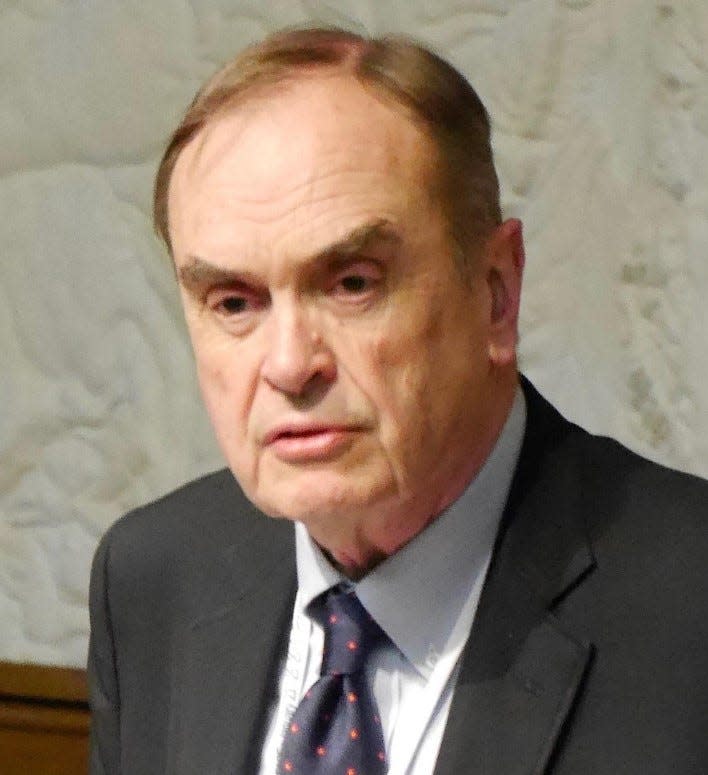Richard Killmer: Houses of worship can be good stewards of their finances, creation
The Refuge, a Christian Reformed Church in Grandville, Michigan, had been active in caring for creation, including protecting Rush Creek which flows near the congregation. When somebody mentioned that maybe the congregation should respond to climate change, there was some reluctance to working on an issue that was controversial. Yet as the congregation learned more, especially about the damage that was being caused by the more intense wildfires and hurricanes, droughts, sea level rise, and floods, members were opened to consider possible steps they could take.
In the fall of last year, that opportunity presented itself, when Rev. Gerry Koning, pastor of the Refuge learned about Solar Faithful, a new initiative that aims to increase solar access to faith communities in Michigan.

Pastor Gerry told the congregation, “Adding solar panels to our roof will be a witness to our commitment to be being good stewards of our finances and good stewards of God’s creation.”
Rev. William Uetricht, pastor of First Lutheran Church in North Muskegon, agrees. They had two solar panels lighting the church’s sign and a Green Team that was involved in protecting creation, so adding more solar panels was not difficult for the congregation. It wanted to make a strong witness that many people of faith are addressing the climate crisis. “We want to be stewards of the whole creation and all of life,” said Pastor Bill.
Solar Faithful, because it has investors, is able to offer free solar panels to congregations of all faiths and also guarantees a reduced price (at least 10%) that the congregation (or a faith-based non-profit) pays for the electricity produced. Solar Faithful installs the panels without cost and will provide any maintenance needed. The agreement with each congregation will be in effect for 25 years.
Installing solar arrays is a terrific way to both combat climate change and reduce the air pollution that is a threat to everyone. First and foremost, these emissions impact people of color and low-income communities and the people living there. Solar Faithful’s goal is that 50% of the participating organizations in this project will be congregations that are primarily people of color, low-income and/or represent diverse, non-Christian faith traditions.
The way it works is those congregations submit a form indicating their interest along with electric bills for the previous 12 months to Solar Faithful. The organization then sends a draft proposal back to the congregation. Solar Faithful and the congregation will together develop a plan which is acceptable to both parties.
If a house of worship wants to reduce its monthly cost for the electricity produced by the solar panels even more, it is able to purchase the solar panels at the beginning of the project. In doing so, it takes on some risk and responsibility as it borrows or raises the money to fund the project and is responsible for operations and maintenance.
The majority of the three dozen solar installations at Michigan faith communities have been funded by internal capital fundraising campaigns. For houses of worship that don’t have access to the upfront capital, Solar Faithful presents an alternative opportunity for accessing the benefits of clean energy.
Solar Faithful is sponsored by World Renew, Climate Witness Project, Michigan Interfaith Power and Light, and Charthouse Energy.
A decade ago, the Christian Reformed Church (CRC) synod adopted a report that affirmed that climate change is real and a serious problem, and called the church to take action at the individual, congregational and denominational levels. The actions recommended included energy stewardship, education, and advocacy.
In 2015, CRC’s Office of Social Justice launched the Climate Witness Project (CWP) to help congregations to start to take these actions. One of the actions many congregations consider is installing solar power. There have been are only a handful of CWP congregations that have installed solar arrays. Those congregations were able to accomplish that task because they did it by running a capital campaign, identifying a solar developer, and installing the array. Only congregations that have adequate resources (i.e., money, time, and technical and financial expertise) were able in a position to participate.
Solar Faithful is in a position to change all that. It is able to help congregations of all faiths and of all income levels to put solar panels on their roofs or their property and enjoy electricity produced by the sun. Doing so protects God’s creation for generations to come — an important element of faithfulness.
You can view a Channel 17 story on the solar panels at the Refuge church at bit.ly/45odDyT. You can also learn more by writing to: steve@solarfaithful.org. Click here (solarfaithful.org) and click “Let’s Get Connected” to complete the form to indicate your interest.
— Rev. Richard Killmer is a retired Presbyterian minister, living in East Grand Rapids.
This article originally appeared on The Holland Sentinel: Richard Killmer: Churches can be good stewards of finances, creation

